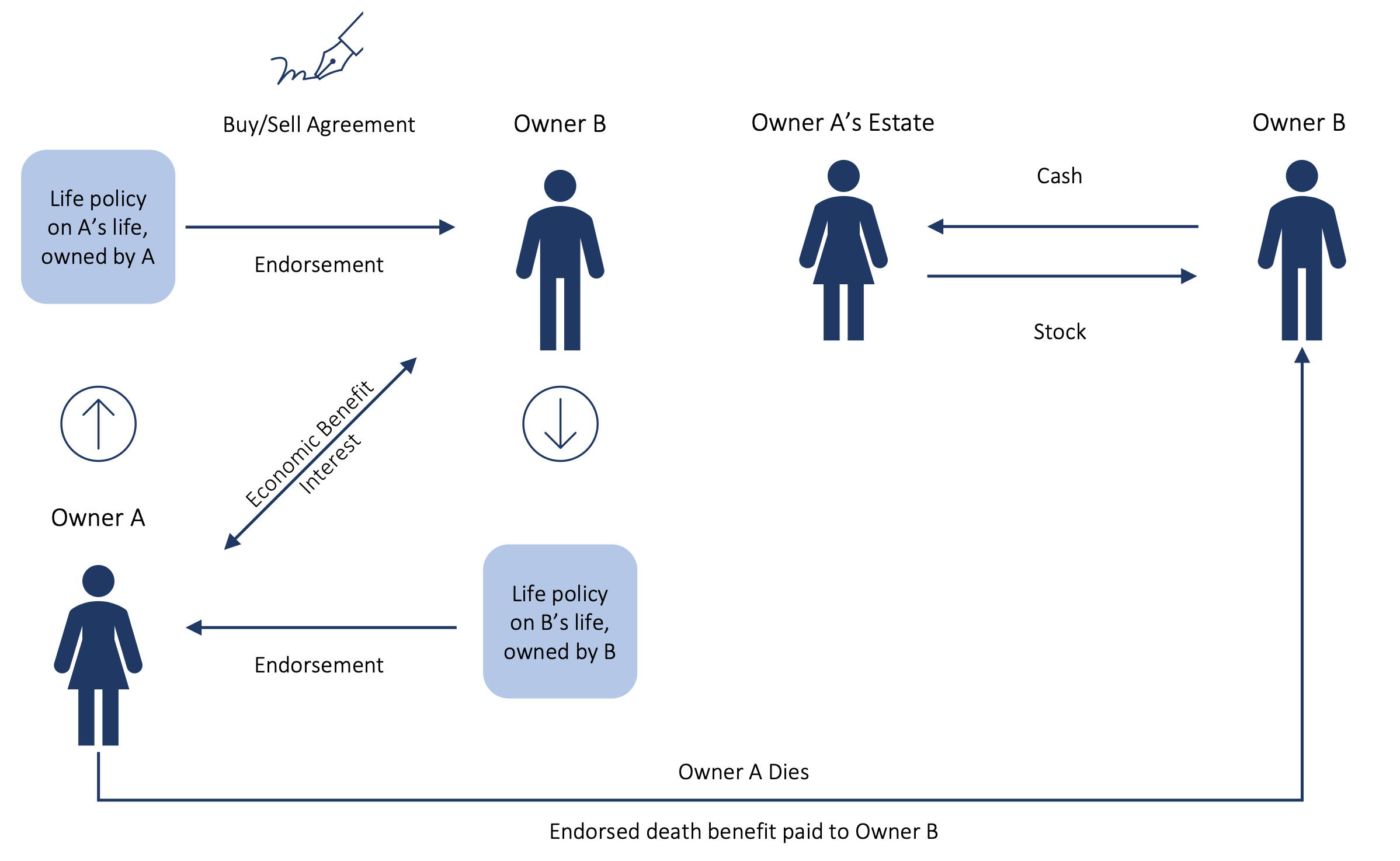A Buy-Sell Arrangement that Benefits the Living and the Dead

The Smartest Way to Fund a Buy-Sell Agreement: Unlocking Financial Security for Business Owners
As insurance agents and financial advisors, guiding business owners through the complexities of succession planning is a critical responsibility. One of the most effective tools in this process is a well-structured Buy-Sell Agreement (BSA), which ensures business continuity in the event of a partner’s death or retirement. However, traditional funding methods, such as term life insurance, may not provide the flexibility and long-term benefits that business owners need. Instead, utilizing a permanent life insurance policy with strategic ownership structures can offer enhanced financial advantages.
The Shortcomings of Traditional Buy-Sell Agreement Funding
Historically, BSAs have been funded using term life insurance due to its lower cost. However, this approach fails to account for the long-term financial needs of business owners. Term insurance provides only a death benefit without accumulating cash value or offering living benefits, making it an inefficient funding mechanism when viewed through a broader financial planning lens.
Many business owners also struggle with the issue of policy control. In a traditional cross-purchase agreement, one owner holds the policy on the other, creating potential ownership conflicts. Conversely, in a stock redemption plan, the business owns the policy, limiting the individual owner’s access to policy benefits. These issues often stem from a lack of awareness regarding alternative structuring options that could provide both control and financial leverage.
A Superior Alternative: The Cross Endorsement Buy-Sell Agreement
To address these concerns, financial advisors should consider recommending a Cross Endorsement BSA. This structure provides business owners with control over their own policies while securing necessary buyout funds in the event of a partner’s death.
Key Features of the Cross Endorsement Approach:
- Each business owner owns a permanent life insurance policy on their own life.
- Owners control the policy’s cash value, death benefit, and any living benefits.
- A formal assignment secures the portion of the death proceeds needed to buy out a deceased owner’s share.
- The policy remains a valuable asset for personal financial planning, including retirement income and long-term care.
- The structure avoids unnecessary taxable events or complex transfer-for-value rule complications.
Figure 1: Cross Endorsement Buy/Sell Agreement Mechanics

Maximizing Policy Utility for Business Owners
Advisors should encourage business owners to view their life insurance policies as strategic financial tools rather than mere expenses. By leveraging the benefits of permanent insurance, policies can serve multiple purposes beyond BSA funding:
- Personal Protection: Assess whether the business owner’s personal insurance needs are adequately met. If not, the coverage amount can be adjusted to accommodate both business and personal obligations.
- Long-Term Care Planning: Many permanent policies offer Chronic Illness or Long-Term Care riders, which can provide essential benefits as the owner ages.
- Retirement Planning: Cash value accumulation within a permanent policy can serve as a tax-advantaged supplement to retirement income, particularly for owners who face contribution limitations in qualified retirement plans.
Implementation Considerations and Potential Pitfalls
While the Cross Endorsement structure offers compelling advantages, it requires careful implementation to avoid potential pitfalls. Financial advisors should emphasize the following considerations:
- Ensure a Formal, Written Agreement: A properly drafted and regularly reviewed BSA is essential for maintaining clarity and avoiding disputes.
- Regular Business Valuations: The agreement should reflect updated business valuations to ensure adequate funding.
- Tax Implications: If premiums are paid through the business, they may be treated as taxable compensation to the owner. Additionally, the economic benefit of the assigned coverage may create tax liabilities.
Advantages of the Cross Endorsement Buy-Sell Agreement
Financial advisors should highlight the following benefits when discussing this approach with business owners:
- Personal Policy Ownership: Owners name their own beneficiaries and retain control over the policy’s cash value.
- Equitable Funding: Younger and healthier owners are not burdened with funding coverage for older or less healthy partners.
- Increased Cash Value Growth: Owners can structure policies to build substantial cash value for future use.
- Portability: If the business dissolves or the owner retires, they retain the policy and its benefits.
- Creditor Protection: Depending on state laws, personally owned policies may be shielded from business creditors.
Conclusion
For financial advisors working with business owners, the Cross Endorsement Buy-Sell Agreement represents a sophisticated yet accessible planning strategy. By replacing term insurance with a permanent solution and optimizing policy ownership, advisors can help clients achieve not only a well-funded BSA but also enhanced retirement security, long-term care protection, and financial flexibility. Encouraging business owners to think beyond the immediate need for a buyout mechanism and view their insurance as a strategic asset can transform their overall financial plan, ensuring they maximize both business continuity and personal wealth accumulation.
%20(1).png?width=200&height=59&name=Gen3%20Logo%20(No%20Advisor%20Group)%20(1).png)

